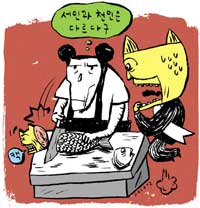Progressive seomin?
| In my explorations into the Korean culture and society, following the anthropologists' habit (and my supervisor's advice) of paying attention to the use of concepts, I've come to show a lot of interest on the concept of sômin (seomin), as one of the Korean words for "people" in the sense of politically disinterested or unconscious masses or ordinary people. My interest on that has stemmed from what in my view has been an overemphasis on the idea of minjung (民衆) in scholarship and from the simple observation that seomin is a widely used term as self-identification and as defining others. Especially before elections, seomin is a favorite term of politicians from the Hannara (Grand Korea) Party to Dem. Labor Party to use about people somewhere below the middle class.
This is almost like turning around the idea that seomin are those who besides being less well-off, having difficulties acquiring decent housing, living from hand to mouth (하루 벌고 하루 먹다), are also politically unmotivated and unconscious and do not act out of common political interests but individual or familial economic interests. Why not, concepts do change over time. And it's not fitting from the point of view of the present government the idea that "ordinary people" would be conservative and disinterested in reforms and all kinds of political stuff. But perhaps the politician who visited a marketplace last ch'usôk knows that it's the economy. Categories at del.icio.us/hunjang: seomin ∙ Koreanpolitics ∙ socialcategories ∙ stratification |




Comments to note "Progressive seomin?" (Comments to posts older than 14 days are moderated)
Write a Comment